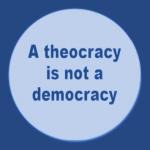Clerics want more influence on all EU agencies: text from CEC and COMECE (2010)
Bit by bit the vague wording of Article 17.3 of the Lisbon Treaty is being used by the religious lobby to extend their privileges. The demands in this document include regular access to European Union law makers and all EU organisations at strategic times and behind closed doors.
|
|
This document demonstrates the advances made towards achieving the goals already set out by CEC and COMECE in 2002 and further articulated by COMECE in 2007. (The only area it is silent about is the Catholic “pro-life” agenda mentioned in the latter, which ominously advocates “limitations to the concept of tolerance”.) |
Most of it, (parts I-III) is a self-congratulatory attempt to justify giving the churches more influence in the EU government. Here “dialogue” appears to be church-speak for “lobbying”. It is claimed that “dialogue between political institutions and religious communities is a significant element of participatory democracy” misconstruing democracy which means that the people speak, not the unelected bishops.
The paper is an opening wedge, concerned with “deepening and widening existing dialogue practices” using Article 17.3 as a justification. However, it is careful to state that the churches initial demands are “without prejudice to any further specific suggestions” they may later make, thus explicitly permitting salami tactics.
These are already in evidence in the paper’s demands The first (IV.1) is that the consultations be extended from the EU’s three governing bodies to “other EU institutions and bodies”. Taking part are individual churches and church organisations, as well as “joint initiatives”.
Their second demand (IV.2) is for the EU to “upgrade and enhance” the consultations. This means setting up a framework to facilitate lobbying “the other EU institutions” and it also means ensuring that this take place in advance, so that they can have input on “forthcoming legislative projects and political initiatives”. Specifically, there should be "common content preparation prior to the events" and collaboration on any follow-up. For this they demand an annual meeting "in due time before the Commission unveils its strategy for the coming year and its legislative and work programme".
The dialogue should be both collective and with individual churches. There should be “common content preparation prior to the events” and collaboration on any follow-up. And in line with their previous demand for pre-legislative consultation, they propose an annual meeting “in due time before the Commission unveils its strategy for the coming year and its legislative and work programme”.
This demand for “dialogue” gives teeth to the ominous Article 17.3 of the Lisbon Treaty. It can be used to put a cleric on every committee and then to conceal exactly what went on. That's because the curious kind of “openness” and “transparency” to which they adhere does not include a published record of the meetings which are required for the parliamentary debates of a democracy. No Hansard or Congressional Record for them. This document prepares the way for lobbying throughout the whole EU government by unelected clerics in closed meetings with no published minutes.
The document by the CEC and COMECE is dated Spring 2010 and is titled Article 17 of the Treaty on the Functioning of the European Union: General considerations on the implementation of the dialogue foreseen by its Paragraph 3








 To cut off human rights at source, religious lobby targets Europe from two sides
To cut off human rights at source, religious lobby targets Europe from two sides
